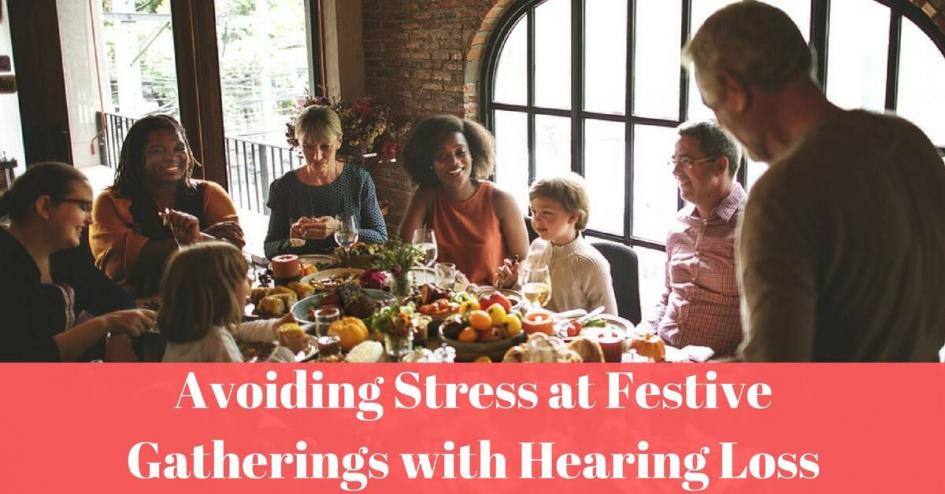
Avoiding Stress at Festive Gatherings with Hearing Loss
Avoiding Stress at Festive Gatherings with Hearing Loss
The holiday season is finally upon us. With dinners to cook, presents to wrap and last-minute shopping to do, you probably have enough on your plate without worrying about hearing loss.
Festive gatherings bring your nearest and dearest together. This can lead to some noisy situations, from excited kids unwrapping gifts to inebriated relatives singing carols. Those of us with hearing loss know the perils of background noise and rooms full of people talking. Modern hearing aids are designed to help us cope with these situations better than ever before, but there are a few practical precautions you can take to make the festive season run more smoothly.
Look after your hearing aids
This is rule number one at any time of year, and it’s even more important during the holidays. You should clean your hearing aids every day, and check the wax filters regularly, to make sure they’re in perfect working condition. We also recommend keeping your hearing aids in a dry box (dehumidifier) overnight, to make sure any extra moisture is dried out before the morning. These tips will help prolong the life of your aids and batteries.
Many shops and services will be closed, and if your hearing aid breaks, it can be hard to find a replacement in the holiday rush. Make sure you have extra batteries and spare parts to hand. Don’t forget to pack a spare set of batteries if you are spending the night away from home.
Think about where to sit
If you are hosting a dinner party, organizing a seating plan can help to make things more comfortable for guests with hearing loss. If you’re attending a dinner or office party elsewhere, the following tips will also be useful.
It can be helpful to sit near a good friend or relative who understands your hearing loss and can help repeat conversation you miss. If you’re eager to keep up with the chit-chat, seat yourself in the middle of the table so you have better access to everyone.
If background noise is a problem for you, find a table at the edge of the room and sit with your back to the wall. This will limit the amount of sounds around you, and make it easier to concentrate. It’s also a good idea to avoid sitting near the kitchen, which will be one of the noisiest areas of the house or restaurant.
Using small round tables will help to keep social groups manageable and make discussions easier.
Enjoying your evening
It’s a good idea to set aside a quieter area of the party area, so people with hearing loss can have clearer conversations or rest their ears. If you’re having trouble hearing in a noisy room, head for the corner where noise levels will usually be lower. Don’t be afraid to ask your hosts to turn the Christmas music down if it’s interfering with your hearing. On the other hand, be aware that other guests may not need the television volume as loud as you might like it – turning subtitles on can be a good compromise.
If you’re drinking, be aware that alcohol can affect your hearing and may cause temporary tinnitus. Enjoying a tipple won’t hurt, but the more you drink, the harder it will be to hear.
Hearing aid settings
In a noisy situation, using the correct hearing aid settings will make all the difference. Modern hearing aids have a range of specialised programs designed for different sound situations. Think about what kind of gathering you’re attending – a quiet dinner with loved ones, or a raucous office party – and plan ahead. Experiment with your settings before the event, so you don’t waste time fiddling with your aids instead of enjoying yourself.
Most modern hearing aids offer smart apps that can be downloaded onto your smartphone or tablet. These allow you to discreetly control your hearing aid settings from your phone, which can be useful in a busy environment.
Relax and enjoy yourself
Your hearing aids shouldn’t be a barrier to you enjoying the holiday season. Thinking ahead can help you to avoid unnecessary stress on the day, and let you focus on spending quality time with friends and family. If you have any questions about using your hearing aids during the festive season, give us a call on 0131 220 1220, of pop into one of our centres. Happy holidays!
House of Hearing
Edinburgh | Galashiels | Perth | St Andrews
0131 220 1220
Wishing you a joyous holiday season!
Our Clinics
All House of Hearing clinics are in town centre locations and accessible to public transport and parking. Home visits also available if mobility is an issue.


.png)
.png)
.png)

.png)
